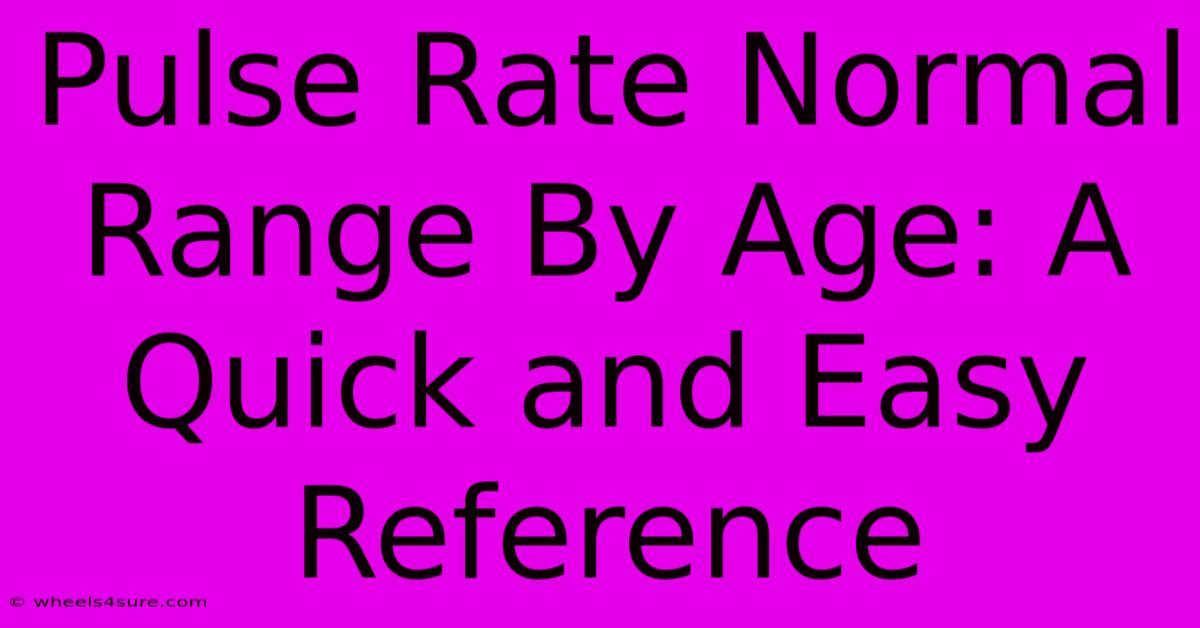Pulse Rate Normal Range By Age: A Quick And Easy Reference

Table of Contents
Pulse Rate Normal Range By Age: A Quick and Easy Reference
Understanding your pulse rate, or heart rate, is a crucial aspect of maintaining good health. Knowing what's considered a normal pulse rate for your age can help you identify potential health issues early on. This guide provides a quick and easy reference for normal pulse rate ranges by age, along with important considerations and when to seek medical attention.
Understanding Your Pulse Rate
Your pulse rate reflects the number of times your heart beats per minute (BPM). It's a simple measurement that can provide valuable insights into your cardiovascular health. A healthy pulse rate indicates efficient blood circulation, while an abnormally high or low rate could signal underlying conditions.
How to Check Your Pulse
Checking your pulse is a straightforward process:
- Find your pulse point: Common locations include your wrist (radial artery) and neck (carotid artery).
- Use your index and middle fingers: Gently press on the pulse point until you feel the rhythmic beat. Avoid using your thumb, as it has its own pulse.
- Count the beats: Count the number of beats in 60 seconds (one minute) for an accurate reading. Alternatively, count for 30 seconds and multiply by two.
Normal Pulse Rate Ranges by Age
While the "normal" range varies slightly depending on the source, the following table provides a general guideline for resting pulse rates (taken while at rest and not engaging in physical activity):
| Age Group | Normal Resting Pulse Rate (BPM) |
|---|---|
| Newborns (0-1 month) | 70-190 |
| Infants (1-11 months) | 80-160 |
| Children (1-6 years) | 75-115 |
| Children (6-10 years) | 70-110 |
| Children (10-15 years) | 60-100 |
| Adults (18+ years) | 60-100 |
| Well-trained Athletes (Adults) | 40-60 |
Important Note: These are average ranges. Individual variations are common, and your personal normal pulse rate may fall slightly above or below these values. Factors such as fitness level, medication, and underlying health conditions can influence your heart rate.
Factors Affecting Pulse Rate
Several factors can influence your pulse rate, including:
- Physical activity: Exercise will naturally elevate your pulse rate.
- Medications: Certain medications can increase or decrease your heart rate.
- Stress and anxiety: Emotional stress can cause a rapid pulse.
- Body temperature: Fever can increase your heart rate.
- Dehydration: Lack of fluids can lead to a faster pulse.
- Underlying medical conditions: Heart conditions, thyroid problems, and other illnesses can impact your pulse rate.
When to See a Doctor
While variations within the normal range are common, you should consult a doctor if you experience:
- Persistently high pulse rate (tachycardia): A consistently elevated pulse rate above the normal range for your age, especially if accompanied by other symptoms like dizziness or shortness of breath.
- Persistently low pulse rate (bradycardia): A consistently low pulse rate below the normal range for your age, especially if accompanied by fatigue or fainting.
- Sudden changes in your pulse rate: A significant and unexplained increase or decrease in your heart rate.
- Irregular heartbeat (arrhythmia): A pulse that is erratic or skips beats.
Regularly monitoring your pulse rate, along with a healthy lifestyle, can contribute significantly to your overall well-being. If you have concerns about your pulse rate or experience any unusual symptoms, it is always best to seek medical advice. This information is for general knowledge and does not replace professional medical advice. Always consult with a healthcare provider for any health concerns.

Thank you for visiting our website wich cover about Pulse Rate Normal Range By Age: A Quick And Easy Reference. We hope the information provided has been useful to you. Feel free to contact us if you have any questions or need further assistance. See you next time and dont miss to bookmark.
Featured Posts
-
Brian Littrells Son The Next Generation Of Stars
Apr 05, 2025
-
Chuck Norriss Astonishing Net Worth You Wont Believe This
Apr 05, 2025
-
Johnny Knoxvilles Daughter Family Secrets Revealed
Apr 05, 2025
-
Laugh Until It Hurts Awful Dad Jokes
Apr 05, 2025
-
Jadeja Age The Age Of Happiness
Apr 05, 2025
